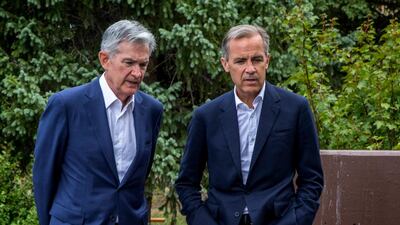A global electronic currency should be created to dampen the domineering influence of the US dollar on global trade, the Bank of England (BoE) governor said on Friday.
In a speech at an annual gathering of central bankers in Jackson Hole in the US, Mr Carney made the case for a global electronic currency that could act as “synthetic hegemonic currency . . . perhaps through a network of central bank digital currencies”.
Mr Carney also suggested the world’s reliance on the US dollar “won’t hold” and needs to be replaced by a new international monetary and financial system based on many more global currencies.
This could "dampen the domineering influence of the US dollar on global trade", the Financial Times reported, quoting from his speech.
Despite an interest rate cut by the US Federal Reserve last month and President Donald Trump imploring Fed chairman Jerome Powell to take bolder action, the greenback has been nearing a three-year high, weakening other currencies against the dollar.
Movements in the US dollar are fundamentally important to other economies even if they have few direct trade links with the US. It accounts for only 10 per cent of global trade and 15 per cent of global gross domestic product, but generates half of trade invoices and two-thirds of global securities issuance, Mr Carney said. Countries are forced to self-insure and hoard dollars to guard against potential capital flight, leading to excess savings and lower global growth, he added.
The Jackson Hole conference, held annually for the past four decades and sponsored by the regional Federal Reserve Bank of Kansas City, is centred on the theme of challenges of monetary policy. This year’s meeting of central bankers occurs against a backdrop of volatile financial markets, rising fears of recession and global trade tensions.
Though he did not elaborate, Facebook’s Libra comes closest to the digital currency Mr Carney described. The digital token - set to be rolled out next year and secured against a basket of reserve-backed currencies - would not be controlled by Facebook, but rather run by a consortium that includes Uber, Mastercard, Stripe, Visa, PayPal and Spotify, among others.
Mr Carney, who is a few months away from stepping down as BoE governor, also said a collapse of Brexit talks resulting in the UK leaving the EU without a transition agreement would likely prompt the BoE to loosen monetary policy.
His speech, delivered to other central bankers, is likely to be seen as an attempt to raise his profile as a possible future International Monetary Fund (IMF) managing director by appealing to emerging economies in particular.
Mr Carney will leave the BoE at the end of January but, lacking support from Europe or the US, currently has little chance of securing the top job at the fund.
The IMF is looking for a candidate to replace the outgoing Christine Lagarde, who will head the European Central Bank after serving eight years at the organisation. The IMF has recommended its board vote to remove a restriction prohibiting anyone above the age of 65 from being appointed managing director. The move is expected to clear the way for current favourite, Bulgaria's Kristalina Georgieva, 66, to succeed Ms Lagarde.


